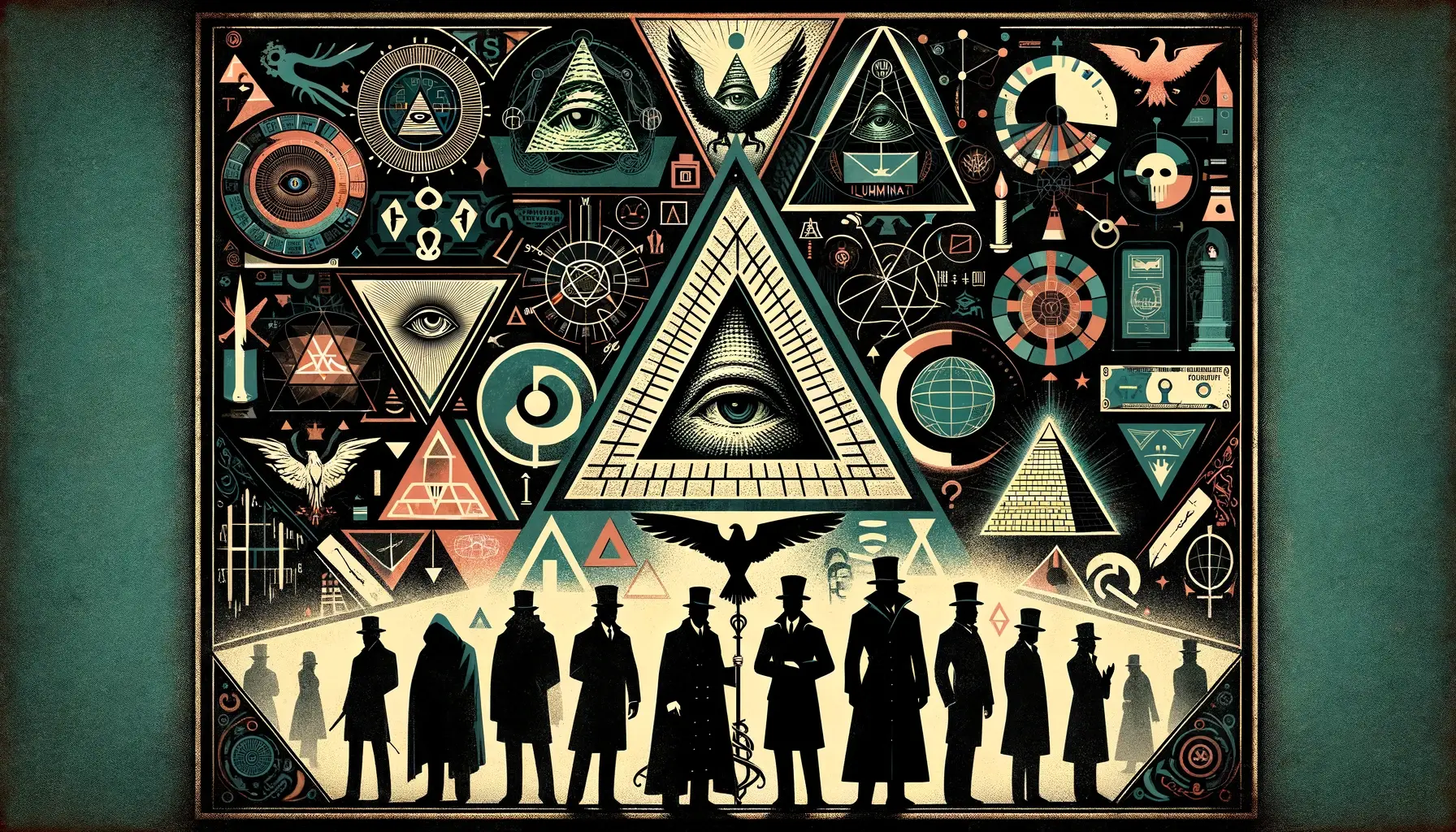In the annals of conspiracy theories, few names evoke as much mystique and curiosity as the Illuminati. This shadowy group, once a real secret society in 18th-century Bavaria, has transcended its historical roots to become a byword for any supposed clandestine cabal influencing world events. The modern myth of the Illuminati is particularly fixated on its alleged sway over significant world events, and with its alleged connection to certain celebrities and influencers, shaping an intriguing narrative that intertwines with Western culture and ideologies.
An Historic Prelude to Modern Myths
Originally, the Bavarian Illuminati was an Enlightenment-era secret society, founded on May 1, 1776, by Adam Weishaupt. Its goal was noble yet radical for its time: to promote ideas of Enlightenment such as reason, secularism, and critical thinking, amidst a Europe dominated by religious dogma and monarchical power. However, in 1785, the society faced a swift end as the Bavarian government, pressured by the Catholic Church, cracked down on secret societies.
Yet, this was not the end, but rather reason for a dramatic rebirth. The dissolution of the Illuminati only fueled speculations and myths. Over time, the term “Illuminati” began to represent not just a disbanded group but an ever-present, omnipotent shadow force controlling global events. The group – though not proven to current exist in any structural form – is assigned responsibility for pulling the strings on countless world-shifting ways, by ardent believers.
The Illuminati, as it exists in popular conspiracy theories, is credited with influencing a wide array of historical events and decisions. It’s crucial to note that these claims lack substantial evidence and are widely regarded as speculative or fictional by historians and experts. However, within the realm of these theories, the Illuminati is often seen as a behind-the-scenes manipulator of significant global occurrences. Here are some key events and decisions that conspiracy theorists often attribute to the Illuminati:
- The French Revolution: One of the earliest and most significant events attributed to the Illuminati is the French Revolution. Conspiracy theorists suggest that the Illuminati’s ideals and influence helped to spark the revolution as a means to undermine monarchical power and spread Enlightenment ideals.
- Formation of New World Order: The concept of a “New World Order” is central to many Illuminati theories. Significant geopolitical events, such as the founding of the United Nations, the establishment of the European Union, and major international agreements, are often cited as steps towards this Illuminati-led global governance.
- Major Wars and Conflicts: Several major wars, including the Napoleonic Wars, World Wars I and II, and even more recent conflicts, are sometimes attributed to the Illuminati. The theory suggests that these were orchestrated to reshape national boundaries, control populations, and consolidate power.
- Financial Crises and Economic Policies: The Illuminati is often implicated in major financial events like the Great Depression, the 2008 financial crisis, and significant shifts in global economic policies. Conspiracy theorists argue these events are engineered to control global economies and centralize financial power.
- Assassinations and Political Upheaval: The assassinations of historical figures such as Abraham Lincoln, John F. Kennedy, and even the more recent mysterious deaths of influential individuals are sometimes connected to the Illuminati. The theory suggests these were carried out to remove obstacles to the Illuminati’s agenda or to create political instability that can be exploited.
- Technological Advancements and Surveillance: The rise of surveillance technology, internet control, and advancements in AI are sometimes seen as Illuminati tools for monitoring and controlling the global population.
- Influence on Popular Culture and Media: A more modern aspect of Illuminati theories is the supposed control over popular culture and media. Major events in the entertainment industry, shifts in cultural trends, and the prominence of certain celebrities are viewed as being influenced by the Illuminati to shape public opinion and spread specific ideologies.
- Space Exploration and Secret Projects: Some theorists even extend the Illuminati’s reach to space exploration programs and secret government projects, suggesting hidden motives behind these endeavors.
- Public Health and Global Pandemics: In recent times, responses to global health crises, like the COVID-19 pandemic, have been added to the list of events said by some to have been influenced by the Illuminati, with theories suggesting manipulation of public health for broader control.
- Environmental Policies and Climate Change: Decisions and movements related to climate change and environmental policies are also seen by some as being influenced by the Illuminati, either as a means of exerting further control or reshaping global economies.
These attributions are part of a complex web of conspiracy theories that paint the Illuminati as a virtually omnipotent and omniscient group. While intriguing and often serving as material for speculative fiction, it’s essential to approach these claims with critical thinking and a discerning eye towards evidence and historical accuracy.
The Illuminati in Pop Culture: Celebrities Under the Spotlight
In contemporary conspiracy lore, the Illuminati is seen as a puppeteer, with famous personalities as its marionettes. This narrative suggests a world where:
- Celebrity Pacts: Stars owe their meteoric rises not to talent or serendipity, but to secret deals with this powerful cabal. The price? Allegiance and service to the Illuminati’s global agenda.
- Ominous Symbolism: Proponents of Illuminati theories are quick to point out symbols like the all-seeing eye, pyramids, or specific hand gestures in music videos, award shows, and public appearances of celebrities. These, they argue, are not mere coincidences but deliberate signals of allegiance.
- Mind Control and Manipulation: In the most extreme versions of these theories, celebrities are thought to be under sophisticated mind control, used by the Illuminati to influence their actions and, by extension, their vast fanbases.
Shaping Western Thought and Ideology
The Illuminati conspiracy theories, though often dismissed by experts, undeniably influence public perception in various ways. Obviously, thought is shaped most pointedly in communities that believe the Illuminati is a real organization that carries real power, but even outside of a core of believers, the persistence of the notion has affected popular discourse in several broad ways. These include:
- Cultivating Distrust: The presence of such theories engenders a widespread distrust of mainstream media, entertainment and politics. It suggests that there are always hidden, often sinister, forces at play behind the glamorous façade of celebrity life and of democratic political processes.
- An Alternative Lens: For many, these theories offer an alternative lens through which to view the perplexing and seemingly unjust world of politics and celebrity culture. It can be comforting to consider a complex web of unrelated events as being somehow part of a connected “bigger picture” or one group’s powerful agenda in order to make sense of an often confusing world.
- The Role of Social Media: In the digital age, these theories have found fertile ground on social media platforms. Here, communities dedicated to unraveling supposed Illuminati plots and symbols in pop culture flourish, bringing together believers and meme-makers from all corners of the globe.
The Dark Side of Intrigue
While engaging and mysterious, these theories are not without their pitfalls. Believing in a group that is supposedly involved in the manipulation of a large proportion of major world events can deliver real-world risks. Some of the most evident drawbacks of supporting such an all-encompassing theory include:
- Absence of Concrete Proof: Critics of Illuminati conspiracy theories point out the conspicuous lack of hard evidence supporting the vast and complex claims made. If this secret society really exists and carries the level of power that is claimed, it certainly does well to keep its membership, finances and operations out of sight.
- Risks of Misinformation: The spread of such theories can have real-world consequences, leading to harassment of public figures and a general erosion of trust in verifiable information sources.
- Exploiting Fears: At their core, these theories exploit human fears and uncertainties, offering simple yet deceptive explanations for the complexities of global events and fame.
A Concluding Reflection
The enduring fascination with the Illuminati and its supposed influence on celebrities and popular politics reflects deep-seated human tendencies to find patterns and ascribe meaning to the unknown. The Illuminati conspiracy theories serve as a modern mythology, providing intrigue and a sense of wonder in an increasingly rational world. They remind us of the allure of the mysterious and the unexplained, even as we approach them with skepticism and critical thought.
In a world where the lines between truth and fiction are often blurred, the Illuminati conspiracy theories stand as a testament to the power of human imagination and our unending quest to make sense of the world around us. Whether seen as a harmless diversion or a misleading distraction, the narrative of the Illuminati continues to captivate and provoke thought, reflecting the complexities of the human psyche in our continuous search for understanding.
At Ancient Theory we only use trusted sources to document our articles. Such relevant sources include authentic documents, newspaper and magazine articles, established authors, or reputable websites.
- Melanson, T. (2009). Perfectibilists: The 18th Century Bavarian Order of the Illuminati.
- Barkun, M. (2013). Culture of Conspiracy: Apocalyptic Visions in Contemporary America.
- Dentith, M. R. X. (2018). The Philosophy of Conspiracy Theories.
- Robertson, D. (2016). The Occult World.
- Goodrick-Clarke, N. (2002). Black Sun: Aryan Cults, Esoteric Nazism and the Politics of Identity.
- Byford, J. (2011). Conspiracy Theories: A Critical Introduction.
- Aaronovitch, D. (2010). Voodoo Histories: The Role of the Conspiracy Theory in Shaping Modern History.
- Uscinski, J. E., & Parent, J. M. (2014). American Conspiracy Theories.
- Sunstein, C. R., & Vermeule, A. (2009). Conspiracy Theories: Causes and Cures.
- Pipes, D. (1997). Conspiracy: How the Paranoid Style Flourishes and Where It Comes From.






